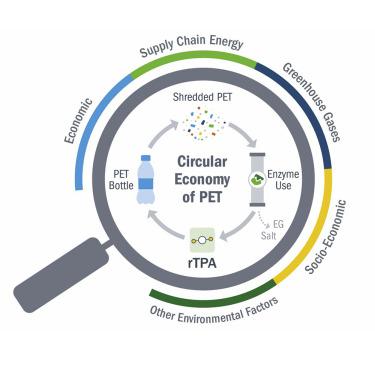Joule ( IF 39.8 ) Pub Date : 2021-07-15 , DOI: 10.1016/j.joule.2021.06.015 Avantika Singh 1, 2 , Nicholas A. Rorrer 1, 3 , Scott R. Nicholson 1, 4 , Erika Erickson 1, 3 , Jason S. DesVeaux 1, 2 , Andre F.T. Avelino 4 , Patrick Lamers 4 , Arpit Bhatt 4 , Yimin Zhang 4 , Greg Avery 4 , Ling Tao 2 , Andrew R. Pickford 1, 5 , Alberta C. Carpenter 1, 4 , John E. McGeehan 1, 5 , Gregg T. Beckham 1, 3

|
Esterases have emerged as important biocatalysts for enzyme-based polyester recycling of poly(ethylene terephthalate) (PET) to terephthalic acid (TPA) and ethylene glycol (EG). Here, we present process modeling, techno-economic, life-cycle, and socioeconomic impact analyses for an enzymatic PET depolymerization-based recycling process, which we compare with virgin TPA manufacturing. We predict that enzymatically recycled TPA (rTPA) can be cost-competitive and highlight key areas to achieve this. In addition to favorable long-term socioeconomic benefits, rTPA can reduce total supply chain energy use by 69%–83% and greenhouse gas emissions by 17%–43% per kg of TPA. An economy-wide assessment for the US estimates that the TPA recycling process can reduce environmental impacts by up to 95% while generating up to 45% more socioeconomic benefits, also relative to virgin TPA production. Sensitivity analyses highlight impactful research opportunities to pursue toward realizing biological PET recycling and upcycling.
中文翻译:

聚对苯二甲酸乙二醇酯酶促回收的技术经济、生命周期和社会经济影响分析
酯酶已成为将聚对苯二甲酸乙二醇酯 (PET) 转化为对苯二甲酸 (TPA) 和乙二醇 (EG) 的酶基聚酯回收的重要生物催化剂。在这里,我们介绍了基于酶促 PET 解聚的回收过程的过程建模、技术经济、生命周期和社会经济影响分析,我们将其与原始 TPA 制造进行了比较。我们预测酶促回收 TPA (rTPA) 具有成本竞争力,并突出实现这一目标的关键领域。除了有利的长期社会经济效益外,每公斤 TPA,rTPA 还可以将供应链总能源使用量减少 69%–83%,温室气体排放量减少 17%–43%。美国的一项经济范围评估估计,TPA 回收过程可以减少高达 95% 的环境影响,同时产生高达 45% 的社会经济效益,也相对于原始 TPA 生产。敏感性分析突出了有影响力的研究机会,以实现生物 PET 回收和升级。


























 京公网安备 11010802027423号
京公网安备 11010802027423号